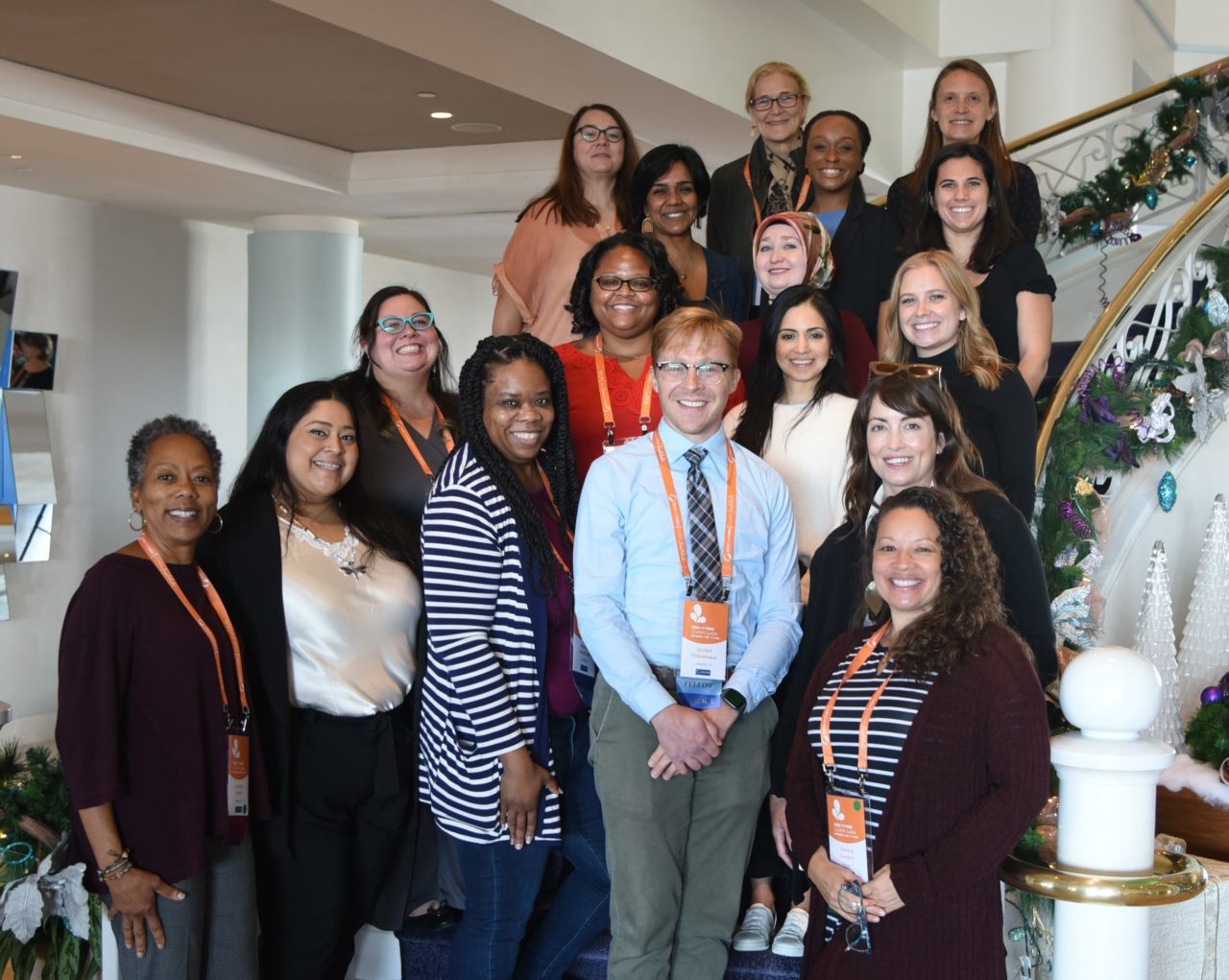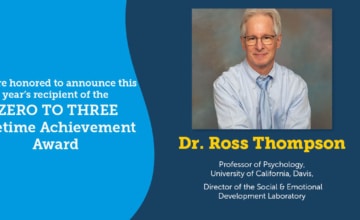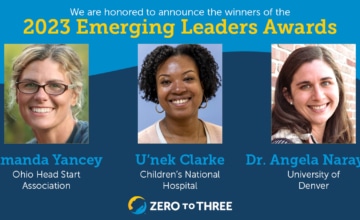FOR IMMEDIATE RELEASE
MEDIA CONTACT
Siobhan Mueller
smueller@zerotothree.org
(202) 857 2609
20 global early childhood leaders will engage in 18-month transformative leadership experience
Washington, D.C., January 12, 2023 – ZERO TO THREE, the leading nonprofit dedicated to ensuring all babies and toddlers have a strong start in life, proudly announces its 2022-24 Fellowship Class, welcoming 20 global leaders to the premier leadership development program in the early childhood field. The Fellows will embark on an intensive 18-month program to strengthen critical skills and deepen connections in their work to advance fair, equitable, and just change in programs, systems, and policies affecting the health and well-being of babies, young children, and families. This class was selected from the Fellowship’s largest applicant pool in the program’s 32-year history.
“I am honored to welcome such an esteemed group of leaders to the Fellowship and excited for the journey ahead,” said Matthew Melmed, ZERO TO THREE Executive Director, “Each Fellow brings a vision for change and a deep commitment to advancing bold ideas that will not only improve the lives of babies but also make the world better and brighter for all.”
With expertise spanning infant and early childhood mental health (IECMH) clinical services, program administration, research, and early childhood policy, these leaders serve urban, rural, and indigenous communities across the United States, Australia, Pakistan, and Myanmar.
“We are proud to provide an intellectual, professional and developmental home that supports a new generation of change makers,” said Lynette Aytch, Director of the ZERO TO THREE Leadership Development Institute. “Their focus over the next 18 months will address critical issues with effective solutions that are inclusive, equitable, culturally relevant, and attainable. It is a privilege to be on this journey of professional and personal growth with them.”
Upon completion of the Fellowship, the 2022 – 2024 class will join more than 300 national and international leaders as members of the esteemed Academy of ZERO TO THREE Fellows Alumni Network.
The 2022-24 Fellowship Class includes:
Valeria Atanacio, Oregon, serves as the Tribal Affairs Director within Oregon’s Department of Early Learning and Care (DELC) forming the agency’s Office of Tribal Affairs and leading the co-creation of the Tribal Early Learning Alliance alongside tribal leaders from each of the nine federally recognized tribal nations within Oregon’s borders. She is a member of the Confederated Tribes of Grand Ronde with ancestral ties to the Shoshone-Banook, Chinook, Northern Ute, Umpqua, and Tututni tribal bands. As the first tribal dedicated position within the organization, she has grown this role to be the primary liaison on tribal issues concerning early childhood education.
Pyae Phyo Aung, Myanmar, is a Child Development Specialist at Ministry of Health, The Republic of the Union of Myanmar. He also works as a specialist assistant at the pediatric neurology unit of the Children’s Hospital, Mandalay. He is leading an early intervention team of child development clinics with the aim of holistic developmental services for children with special needs.
Amy Finlay-Jones, Australia, is the Head of the Early Neurodevelopment and Mental Health Team at the Telethon Kids Institute in Perth, Western Australia and a Healthway WA Senior Research Fellow. Dr. Finlay-Jones is a registered psychologist and health economist, and her research interests and expertise span the spectrum of clinical research through to health systems research, policy development, and economic evaluation. Her research focuses on promoting more equitable mental health and developmental outcomes for infants and young children. Dr. Finlay-Jones is interested in the design and implementation of accessible, culturally secure, and empowering infant mental health services and systems.
Yolanda Fountain Hardy, Georgia, is a licensed counselor in the states of Georgia and North Carolina, a clinical and play therapy supervisor and trainer, a mental health forensic consultant, and a sand therapy specialist. Over the course of her mental health career, Dr. Fountain Hardy has diagnosed, evaluated, and treated infant, child, adolescent, adult, and geriatric clients with psychiatric disorders, histories of trauma, and experiences of complex grief in the public sector, private sector, higher education, and hospital settings. Dr. Fountain Hardy is the owner and executive director at Play Wellness LLC, the founder of the Child Loss Center Inc., and the President of the Georgia Association for Play Therapy.
Jessica M. Gordon, Florida, is currently a pediatric nurse practitioner at Pediatrics of Tampa Bay. Immediately after graduating with her undergraduate degree at the University of Arizona, she took to working with the high-risk obstetric and neonatal infant population in Tampa, Florida.
Marla Hatrak, California, is dedicated to ensuring that deaf babies have access to both American Sign Language and English literacy, so they are kindergarten-ready. She has since been involved with local, state, and national activities advocating for signed language acquisition and English literacy for all deaf children. Dr. Hatrak is co-founder of both the Alliance for Language and Literacy for Deaf Children (ALL for Deaf Children) and the Language Equity and Acquisition for Deaf Kids (LEAD-K), a California grassroots legislative effort to ensure that deaf babies get language milestones assessment starting at six months of age. The result was SB 210, currently a model for other states to pass their respective legislation. Dr. Hatrak co-edited The Road to Kindergarten Readiness: Language Policy for Deaf Children Ages 0-5, outlining the issues of language acquisition and development of deaf children that impacted their K-12 academic success.
Fatima Kadik, New York, is the Director of Early Childhood Mental Health Services at the New York City Department of Health and Mental Hygiene. Ms. Kadik leads efforts to strengthen early childhood systems and enhance access to specialized infant and early childhood mental health services for young children and families using a research-informed and equity-focused approach. Ms. Kadik oversees the NYC Early Childhood Mental Health Network (ECMH Network), publicly funded in 2016 to increase the availability of community-based early childhood mental health services. Under Ms. Kadik’s leadership, the ECMH Network is incorporating a focus on perinatal mental health through service expansion, workforce development, and policy change, recognizing stable foundations start before birth.
Kelly McGlothen-Bell, Texas, is an Assistant Professor at UT Health San Antonio, School of Nursing. Her program of science focuses on leveraging parent-engaged research strategies to promote parent-infant mental health-related policy and eliminate health inequities. Dr. McGlothen-Bell ‘s research examines questions such as how intersectional stigma and individual and structural bias and discrimination impact parent engagement and early life stress for mother-infant dyads affected by mental health and substance use disorders. Using integrated approaches to dissemination and implementation science, as well as community-based participatory research (CBPR) methodologies, her work crosses health, justice, and social service sectors to ensure that family-centered interventions and policy reach mother-infant dyads in both clinical and community settings.
Andrea G. Oliveira, Massachusetts, is a clinical psychologist by training with 15 years of experience working with children and families both in Portugal and in the United States. Currently, she leads Infant and Early Childhood Mental Health Policy and Initiatives at the Massachusetts Department of Mental Health. Under her leadership, she has focused on promoting IECMH awareness across all sectors, educating stakeholders on IECMH policies and bringing public and private partners to the table by breaking down silos and focusing on common goals that will promote well-being for children under 6 and their families. She has prioritized investment in workforce development initiatives, including Reflective Supervision to non-clinical professionals and enhancing early relational health competencies to a diverse group of professionals. As a Certified DC:0—5 Trainer, she has co-led the expansion of DC:0—5 training statewide, as well as the task force that developed the MA DC:0—5 Crosswalk.
Celeste Poe, California, is a Licensed Clinical Psychologist and Licensed Marriage and Family Therapist. She is a Clinical Instructor and Attending NICU and Perinatal Psychologist at Stanford University School of Medicine. In her role, Dr. Poe provides psychological consultation and psychotherapy to parents of infants hospitalized in the NICU, engages in research and program development, and provides supervision to students. In the perinatal clinic, Dr. Poe provides consultation and psychotherapy to women and families with a range of psychopathology and psychosocial risk factors, high-risk pregnancies, relational issues, parental psychopathology, and trauma.
Roop Zainab Rana, Pakistan, is CEO of The Healing Triad, an organization dedicated to the promotion of mental health and management of mental illness in Pakistan. She is a medical doctor, a psychotherapist and a consultant psychiatrist. Dr. Rana pioneered the Learning for All program with the largest public school system in Pakistan to make learning more inclusive in classrooms across the country. Dr. Rana has also run emotional literacy, anti-smoking campaigns and childhood trauma and treatment awareness program for both schoolchildren and parents.
Sylvan Ryder, New York, is the Director of Operations and a Pediatric Nurse Practitioner for the Columbia University Neonatal Growth and Development (GraD) Clinic, which cares for infants at increased risk for developmental delays, cerebral palsy and other developmental diagnoses due to premature birth or other medical conditions by providing multidisciplinary developmental assessments and ongoing care coordination to former NICU patients ages 0-3. The clinic serves a diverse population, including patients from all five boroughs of New York City, upstate New York and the tri-state area.
Leah Sanchez, California, is a nurse practitioner and serves as Program Manager for the Special Start program at the Alameda County Public Health Department. Located within the Department of Maternal, Paternal, Child and Adolescent Health, Special Start is dedicated to the support of families caring for a premature or medically fragile baby after discharge from the NICU. Through intensive home visiting services, a multidisciplinary team works to address the medical, developmental, and social support needs of a select population of families who are facing intense psychosocial and environmental stressors while also navigating the special needs of caring for a medically fragile baby.
Pamela Scorza, New York, is Assistant Professor of Reproductive Sciences at the Vagelos College of Physicians and Surgeons at Columbia University and an early career researcher with over a decade of experience in global health research in the perinatal period. Dr. Scorza’s research centers on pregnancy and early childhood as a unique window of opportunity for interrupting intergenerational transmission of health risk in populations exposed to concentrated adversity, including poverty, discrimination, and marginalization. She has conducted fieldwork with pregnant women and children in Ghana, Rwanda, Burundi, Peru, Argentina, and the United States, where she has implemented and evaluated perinatal mental health interventions and refined cross-cultural mental health measurement tools. Her current research examines behavioral (maternal-infant relationship quality) and biological (DNA methylation) markers of the upstream formation of infant health and developmental trajectories. She then incorporates these markers of intergenerational transmission in the perinatal period to assess the impact of perinatal interventions on child development.
Kellie Spilman, Tennessee, is the Director of the Early Success Coalition at Porter-Leath, a collective impact initiative that promotes shared, evidence-based practices proven to improve early childhood development and school readiness within Memphis and Shelby County, Tennessee. She oversees the incorporation of evidence-based health promotion strategies to maximize impact in program design and works to build capacity of early childhood programs and professionals.
Danielle “Dani” Stamm Thomas, Oregon, is the Early Learning Hub Director for Clackamas County, Oregon. Over the last 12 years, she has worked with children from infancy up to 13 years old in various child care and early learning settings. Her biggest career challenge is finding solutions to make sure families with infants and toddlers have access to quality care settings that are affordable while making sure that the providers are skilled, supported, and sustainably compensated for their important work.
Aditi Subramaniam, Massachusetts, is a licensed mental health clinician and registered movement psychotherapist with more than fifteen years of experience in the field of mental health, in India and Boston. She works at the Massachusetts Society for the Prevention of Cruelty to Children (MSPCC) leading a statewide workforce development partnership between MSPCC and the Massachusetts Association for Infant Mental Health (MassAIMH) focused on enhancing, diversifying, and supporting the infant and early childhood mental health workforce with the goal of improving access to services for children age birth – six and their families. Under her leadership, Ms. Subramaniam collaborates with partners across the state to address gaps and opportunities in workforce needs in the early childhood system to result in better outcomes for all.
Jordan Thibodeaux, Louisiana, is a Senior Research Associate at the Kathleen Babineaux Blanco Public Policy Center at the University of Louisiana at Lafayette. His research focuses on the role of broad psychological assets (e.g., motivation, belongingness), and how personal and social-cultural growth experienced within non-academic contexts (e.g., sport) can contribute to optimal functioning in educational and youth programs. In his current role, he is focused on conducting policy research and managing program evaluation efforts in child welfare with the Louisiana Department of Children and Family Services. Mr. Thibodeaux is also engaged in his field through peer-reviewed scholarship, as well as dissemination of research directly to early child practitioners working in government and community-based work across child welfare, family services, and education.
Callan Wells, Georgia, is the Senior Health Policy Manager at GEEARS: Georgia Early Education Alliance for Ready Students, where she specializes in helping to build the IECMH system of care in Georgia. Ms. Wells serves as Policy Advisor to the Georgia Association for Infant Mental Health: Birth to Five (GA-AIMH) and co-chairs the IECMH Task Force’s Workforce Development Workgroup and the Interagency Directors Team’s Prevention and Early Intervention Workgroup. In 2019, Callan worked with state leaders in the Georgia House of Representatives on the Infant-Toddler Social-Emotional Health Study Committee. In 2021, she received the Black Child Development Institute of Atlanta’s Emerging Leader Award. In 2022, she received the Emerging Leader Award in IECMH Policy from ZERO TO THREE and the Friend of NAMI Award from NAMI-Georgia.
Shemika Whiteside, Kentucky, is the Founder/Executive Director of Zora’s Cradle in Louisville, KY. Zora’s Cradle is a perinatal nonprofit agency that addresses the gaps in maternity health services that discriminate against individuals from lower socio-economic demographics in Kentucky and result in higher maternal and child mortality rates by providing access to financial and health support pre- and post-pregnancy. The agency provides a plethora of services such as housing assistance, parenting classes, behavioral therapy, case management, and independent living skills to families. The agency operates a Milk Depot that promotes community health by expanding the safe use of human milk for all babies, especially premature and ill infants.



